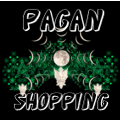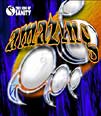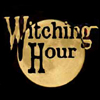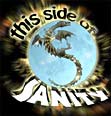|
The earliest ornamental gardens were created in ancient Egypt around 2200 B.C.E., about 600 years before the creation of the Hanging Gardens of Babylon. These gardens were created by Sesh per Ankh priests, primarily for the medicinal qualities of flowers and herbs. The gardens also were considered to show the power of Pharaoh, who grew flowers where nature did not.
Click here for a University of San Francisco web page about the Hanging Gardens of Babylon.
Around 1000 B.C.E. Arab traders who supplied the Mediterranean with cassia and cinnamon made up wild stories of their origin to obscure the real sources and hold onto their spice monopoly. In the first century C.E. the Roman general Pliny the Elder wrote that the Arabian tales were crafted to inflate prices.
Some herbs may be poisonious under some conditions. Exercise appropriate care. There are herbs that were formerly believed to be completely safe that are now known to be dangerous. Knowledge about safety continually evolves and changes.
Wild gathering: Avoid wild gathering. Some plants are endangered species. Some plants can be toxic just by touch. Even experts can make deadly misidentifications of wild plants. Please grow your own herbs in your own goddess garden (or window boxes).
Magikcal substitutions: Rosemary may be safely substituted for any herb in magick spells and rituals. Roses may safely be substituted for any flower.
You can learn about growing herbs and other plants in the article about Witchcraft gardens.
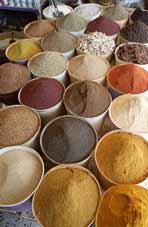 |
| picture courtesy of Mountain Rose Herbs |
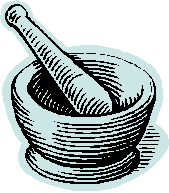 |
herbs:
- abaca
- absinthe
- acacia safe
- aconite toxic
- acorn
- Adam and Eve root
- adder’s tongue
- African violet safe
- agrimony safe
- ague
- ajowan
- alexanders
- alfalfa safe for humans, toxic to horses
- alkanet
- allspice safe
- almond
- aloe
- aloe vera
- aloe, wood
- althea safe
- alyssum safe
- amanita mushroom
- amaranth
- ambrette
- American bittersweet poison
- American elder
- American ginseng safe
- American mistletoe
- ammoniac gum
- anemone
- angelica
- anise
- apple
- apricot
- Arabic gum safe
- arbutus safe
- areca
- arnica
- asafoetida
- ash safe
- Asian pear
- aspen safe
- aster safe
- avens
- avocado
- baby’s breath
- bachelor’s buttons safe
- balm of Gilead safe
- bamboo safe
- banyan safe
- barberry
- barley
- basil
- bay laurel safe
- bayberry
- bay rum
- bdellium
- beech
- beets
- belladonna
- benzoin
- bergamot
- be-still toxic
- betel palm
- betony safe
- birch safe
- birthwort
- bistort
- bitter almond
- bittersweet
- blackberry safe
- black cohosh
- black-eyed susan
- black hellebore
- black nightshade
- black pepper
- black plum
- black tea
- black walnut
- bladderwrack
- bleeding heart
- blessed thistle
- bloodroot toxic
- bluebell
- blue flag toxic
- blueberry safe
- bodhi
- boneset
- borage
- bracken
- Brazil nut
- bromeliad
- broom poison
- bryony poison
- buchu
- burdock">burdock root safe
- buttercup
- cabbage safe
- cachana
- calamint
- camellia
- camomile
- camphor
- candlenut
- cannabis safe
- caper
- capsicum
- caraway safe
- cardamom safe
- carnation
- carob
- cascara sagrada
- cashew
- cassia
- catnip
- cat tail safe
- cayenne
- cedar
- cedars
- celandine poison
- centaury safe
- chamomile
- chapparal
- cherry safe
- chestnut safe
- chickweed safe
- chicory safe
- Chilean clover
- chili pepper safe
- Chinese date
- chives
- chrysanthemum
- cinnamon
- cinquefoil
- citron safe
- clary sage
- cleavers safe
- clove safe
- clover
- club moss
- coconut
- coltsfoot
- columbine
- comfrey
- common sage
- copal
- coriander safe
- corn
- costmary
- costus
- cotton
- cowslip safe
- cranberry
- crocus
- cubeb
- cuckoo flower
- cucumber safe
- cumin safe
- currant
- curry
- cyclamen
- cypress
- daffodil
- daisy
- damiana safe
- dandelion
- date palm safe
- datura poison
- deadly nightshade poison
- deerstongue
- devil’s bit
- devil’s shoestring safe
- dill safe
- dittany of Crete safe
- dock
- dodder
- dogbane
- dogwood safe
- Douglas fir
- dragon’s blood safe
- dulse
- Dutchman’s breeches
- ebony
- echinacea safe
- edelweiss
- Egyptian gum safe
- Egyptian thorn safe
- elder
- elecampane
- elm safe
- eryngo safe
- eucalyptus
- euphorbium
- euphrasia
- European mistletoe
- European yew
- evening primrose
- eyebright safe
- fennel safe
- fenugreek
- fern
- feverfew
- fig safe
- figwort
- fir
- flax
- fleabane
- fleawort
- fo ti
- foxglove
- fragrant bedstraw
- frankincense safe
- fumitory
- fuzzy weed safe
- galangal safe
- gardenia safe
- garlic
- gentian
- geranium safe
- German chamomile
- ginger
- ginseng
- goat’s rue
- golden rod
- golden seal
- gorse
- gotu kola safe
- gourd
- grains of paradise safe
- grape safe
- grapefruit
- green tea
- ground ivy
- groundsel
- gum
- gum acacia safe
- gum ammoniac
- gum arabic safe
- gum bdellium
- gum mastic
- gum scammony
- tragacanth
- hawthorne
- hazel safe
- heather safe
- heliotrope
- hellebore
- hemlock poison
- hemlock tree
- henbane
- hibiscus safe
- hickory safe
- High John the Conqueror
- holly
- honeysuckle
- hops
- horehound
- ho-shou-wu
- houndstongue safe
- houseleek safe
- hyacinth
- hyssop
- Indian cress
- Indian gum safe
- iris
- Irish moss
- ivy safe
- Japanese camellia
- jasmine
- jojoba
- jujube
- juniper
- kava kava
- kelp
- key lime
- knotgrass
- kukui
- lady’s mantle safe
- lavender
- leek safe
- lemon safe
- lemon balm safe
- lemongrass
- lemon verbena safe
- lettuce safe
- licorice
- lilac safe
- lily
- lime
- linden
- liquidamber safe
- lotus
- lovage
- lucerne
- lupine
- mace
- macadamia
- magnolia safe
- ma huang
- maidenhair fern
- maize
- mallow safe
- mandrake
- mango
- Manila hemp
- maple safe
- marigold safe
- marjoram safe
- marsh mallow safe
- mastic gum
- Mexican cress
- meadow rue safe
- meadowsweet safe
- mesquite safe
- mimosa
- mimulus
- mint
- mistletoe, American
- mistletoe, European
- Mormon tea
- mugwort
- mulberry
- mullein safe
- mums
- musk thistle
- mustard
- myrrh
- myrtle
- narcissus
- nasturtium
- neroli
- nettle safe
- niaouli
- nightshade
- nightshade, black
- nightshade, deadly
- nutmeg
- oak
- oats safe
- oakmoss
- olive safe
- onion safe
- opoppnax
- orange safe
- orange bergamot
- orchid
- orris safe
- osha
- ox-eye daisy
- palm
- palmrosa
- pansy safe
- papaya safe
- papyrus
- parsley
- passion flower safe
- patchouly safe
- peach
- pearl barley
- pecan safe
- pennyroyal
- peony safe
- pepper, black safe
- peppermint safe
- pepper tree safe
- pepperwort
- periwinkle
- Persian lime
- Peru balsam
- Peruvian cress
- pine
- pineapple safe
- piñon nuts
- pipsissewa safe
- plumeria
- pokeberry
- pomegranate
- poplar safe
- poppy
- primrose
- purple medic
- quince safe
- ranunculus
- raspberry safe
- red clover
- red sandalwood
- red storax
- red tea
- rooibos
- rhubarb
- Roman chamomile
- rose
- rose geranium
- rosemary
- rowan
- rue
- rye safe
- sacred bark
- sacred sage
- safflower
- saffron
- sagapen
- sage
- sagebrush
- Saint John’s wort
- saltcedar
- sandalwood
- sandalwood, red
- sarsaparilla
- sassafras
- scammony gum
- selenetrope
- sesame
- shea
- silver fir
- Solomon’s seal
- spearmint
- spikenard
- spirulina
- star anise
- stephanotis
- St. John’s wort
- storax
- strawberry
- sumbul
- sunflower
- sweet flag
- sweetgrass
- sweet pea
- tamarisk
- tangerine
- tansy
- tarragon
- thistle
- thyme
- ti
- tobacco
- tonka
- tragacanth gum
- trees
- trefoil
- tuberose
- valerian
- vanilla
- vervain
- vetivert
- violet
- walnut
- water parsnip
- white clover
- white sage
- white willow
- wild bergamot
- wild rice
- wintergreen
- wisteria
- wolfsbane toxic
- wood aloe
- wood betony safe
- woodruff
- wormwood
- yarrow
- yellow dock
- yerba santa
- yew
- ylang ylang
“Oh, my fellow men, do not defile your bodies with sinful foods. We have corn, we have apples bending down the branches with their weight, and grapes swelling on the vines. There are sweet-flavored herbs, and vegetables which can be cooked and softened over the fire, nor are you denied milk or thyme-scented honey. The earth affords a lavish supply of riches, of innocent foods, and offers you banquets that involve no bloodshed or slaughter; only beasts satisfy their hunger with flesh, and not even all of those, because horses, cattle, and sheep live on grass.”, Pythagoras (Greek mathematician). Pythagoras ate bread and honey for breakfast and raw vegetables for supper. He also paid fishermen to throw their catch back into the sea.
Some herbs may be poisonious under some conditions. Exercise appropriate care.
Wild gathering: Avoid wild gathering. Some plants are endangered species. Some plants can be toxic just by touch. Even experts can make deadly misidentifications of wild plants. Please grow your own herbs in your own goddess garden (or window boxes).
See also: herbalism and nutrients.




